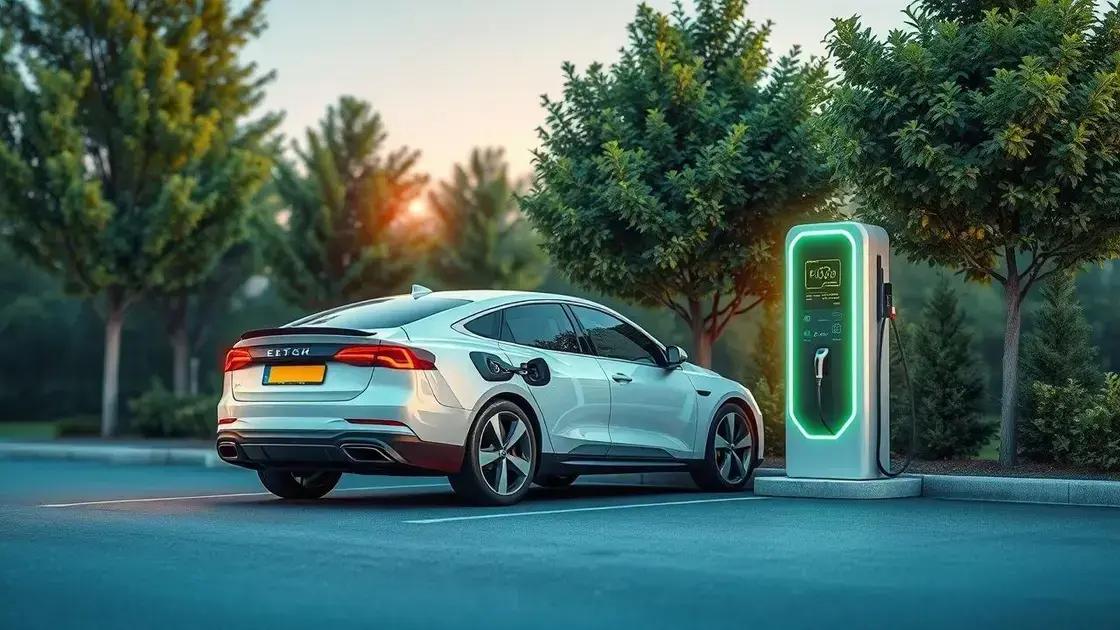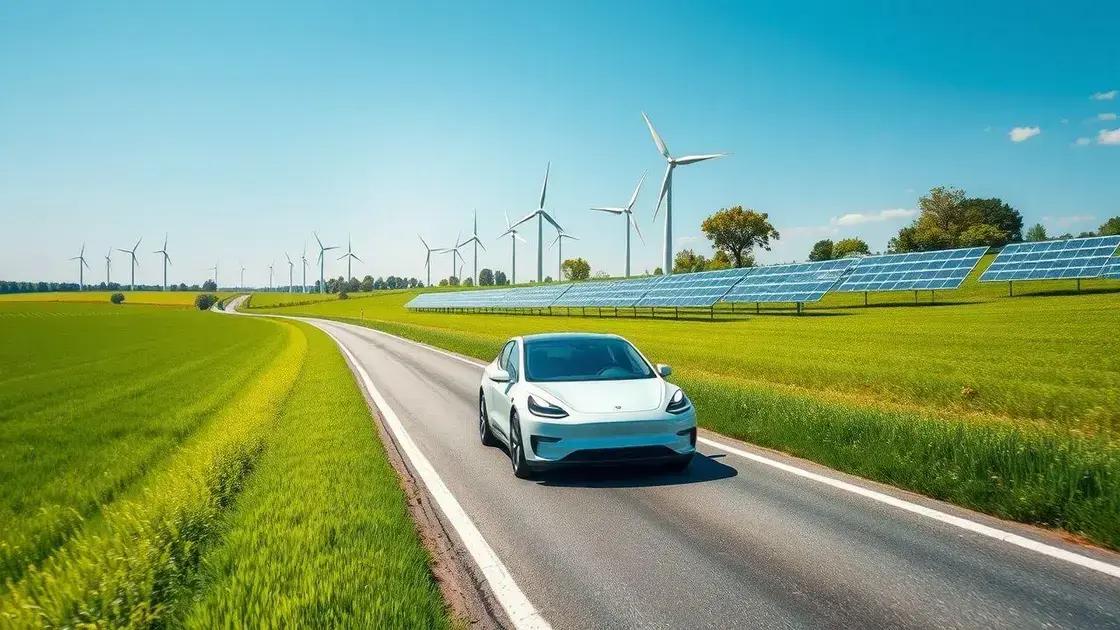Insights on electric vehicle news: latest trends

Insights on electric vehicle news highlight advancements in battery technology, government incentives, and autonomous features, all contributing to a sustainable and efficient transportation future.
Insights on electric vehicle news are more relevant than ever as the world shifts towards sustainable transportation solutions. Have you considered how these developments might impact your daily commute? Let’s dive into the latest trends and implications.
Current electric vehicle innovations
The world of electric vehicles is rapidly evolving, with new innovations shaping the way we think about transportation. As technologies advance, electric vehicles are becoming more efficient, affordable, and appealing to a broader audience.
Battery Technology Advancements
Recent developments in battery technology have significantly influenced the electric vehicle industry. Innovations such as solid-state batteries are on the horizon, promising lighter, safer, and more efficient power sources. These batteries can potentially offer longer ranges and faster charging times compared to traditional lithium-ion batteries.
- Increased energy density
- Improved safety features
- Faster charging capabilities
- Extended longevity
In addition to battery improvements, manufacturers are exploring recycling solutions for old batteries. This approach not only addresses environmental concerns but also helps in the creation of a circular economy.
Autonomous Driving Features
Another exciting innovation in electric vehicles is the advancement of autonomous driving technologies. Many leading companies are testing self-driving features, which can enhance safety and convenience for drivers. With the integration of robust sensors and artificial intelligence, vehicles are becoming more adept at navigating complex environments.
- Adaptive cruise control
- Lane-keeping assistance
- Automatic parking
- Collision avoidance systems
This evolution not only aims to reduce accidents but also opens new possibilities for commuters, like using travel time for work or relaxation. As these technologies mature, they will likely become integral to the driving experience of future electric vehicles.
Moreover, the integration of smart technologies, such as vehicle-to-grid systems, allows electric vehicles to serve as energy sources during peak demand times, showcasing another innovative avenue in the electric vehicle landscape.
Impact of electric vehicles on the environment

The impact of electric vehicles on the environment is a crucial topic as the world transitions to sustainable energy. Electric vehicles (EVs) promise to reduce air pollution and greenhouse gas emissions, contributing to a healthier planet.
Reduced Emissions
One of the key benefits of electric vehicles is their ability to lower greenhouse gas emissions. Unlike traditional gasoline vehicles, electric vehicles produce zero tailpipe emissions. This shift plays a significant role in combating climate change, especially in urban areas where air quality is often poor.
- Lower carbon dioxide emissions
- Reduced particulate matter in the air
- Decreased reliance on fossil fuels
- Mitigation of urban smog
This reduction in emissions not only improves air quality but also promotes public health. Fewer pollutants mean better respiratory health for communities, leading to a more vibrant society.
Energy Source Versatility
Another important aspect of the environmental impact is the energy sources used to power electric vehicles. While EVs are cleaner at the point of use, their overall environmental footprint depends on how electricity is generated.
In regions where renewable energy sources, such as wind or solar, dominate the energy grid, the environmental benefits are even greater. This scenario results in a significant reduction in the carbon emissions associated with operating electric vehicles, further enhancing their positive impact.
- Integration with renewable energy sources
- Potential for energy storage solutions
- Reduction in fossil fuel consumption
- Support for the energy transition
As technology advances, the grid will continue to evolve, allowing for more efficient and cleaner electricity generation. This will further enhance the benefits of electric vehicles on the environment.
Government policies and incentives for EVs
Government policies play a significant role in promoting electric vehicles (EVs) as part of a broader strategy to reduce emissions and encourage cleaner transportation. These policies can take various forms, including financial incentives, infrastructure development, and regulatory measures aimed at manufacturers and consumers alike.
Financial Incentives
Many governments offer financial incentives to encourage the purchase of electric vehicles. These incentives can significantly reduce the overall cost of owning an EV, making them more accessible to a wider audience. Common forms of financial support include tax credits, rebates, and grants.
- Federal tax credits for EV purchasers
- State-level rebates to lower purchase prices
- Incentives for businesses that invest in electric fleets
- Subsidies for charging station installations
These financial benefits not only motivate consumers to consider electric vehicles but also stimulate manufacturers to increase production and innovation.
Infrastructure Development
Investment in EV infrastructure is crucial for the widespread adoption of electric vehicles. Governments are increasingly allocating resources to expand the charging network, making it easier for users to charge their cars conveniently.
Efforts include installing charging stations in public spaces, residential areas, and along major roadways, as well as supporting the development of fast-charging technology. Enhanced infrastructure reduces range anxiety, one of the main barriers to electric vehicle adoption.
- Expansion of public charging networks
- Installation of fast-charging stations
- Support for home charging solutions
- Partnerships with private companies for infrastructure growth
As charging options grow, so does the confidence of potential buyers in making the switch to an EV.
Regulatory Measures
In addition to financial incentives, regulatory measures encourage manufacturers to produce more electric models. Policies may include fuel economy standards and emissions mandates that require automakers to reduce the average emissions of their fleets, pushing them to innovate and offer more electric options.
These regulatory frameworks not only help make electric vehicles more desirable but also support the transition to a sustainable transportation future.
Future trends in electric vehicle technology

The future of electric vehicle technology is bright, filled with innovations that promise to enhance performance and user experience. As the demand for cleaner transportation grows, various exciting trends are emerging in the electric vehicle sector that will shape how we travel.
Advancements in Battery Technology
One of the most significant areas of innovation is battery technology. Researchers are focusing on developing batteries that are lighter, last longer, and charge faster. Solid-state batteries, for example, hold great promise as they can potentially offer higher energy densities and improved safety over traditional lithium-ion batteries.
- Increased energy capacity
- Reduced charging times
- Greater lifespan of batteries
- Enhanced safety features
These advancements will not only lead to longer ranges for electric vehicles but also lower costs due to less frequent battery replacements.
Improved Autonomous Features
Another trend shaping the future is the enhancement of autonomous driving technologies. As automation technology matures, we can expect electric vehicles to integrate advanced safety features and driver assistance systems. This includes improvements in sensors, machine learning, and overall vehicle connectivity.
Features such as automated lane changing, advanced navigation systems, and real-time traffic updates are becoming more common, making it easier and safer to drive electric vehicles.
- Enhanced safety systems like collision avoidance
- Smart navigation and traffic management
- Remote vehicle operation
- Better adaptability in various driving conditions
This technology not only provides convenience but also fosters a more efficient driving experience for users.
Sustainability and Eco-Friendly Innovations
Moreover, the future of electric vehicles is deeply intertwined with sustainability. Automakers are increasingly committed to reducing their environmental impact by using recycled materials in their vehicles. This push for eco-friendliness extends to the production processes and the lifecycle of electric vehicles.
As more companies adopt sustainable practices, we can expect the entire industry to shift toward greener innovations, further promoting the use of electric vehicles.
In conclusion, the advancements in electric vehicle technology are paving the way for a sustainable future. With improvements in battery life, autonomous driving features, and government support, electric vehicles are becoming more efficient and accessible. As innovations continue to emerge, we can expect electric vehicles to play a pivotal role in reducing emissions and promoting cleaner transportation. Embracing these changes can lead to a healthier planet and a more efficient way to travel.
\n\n\n
\n
\n
FAQ – Frequently Asked Questions about Electric Vehicles
What are the main benefits of electric vehicles?
Electric vehicles offer reduced emissions, lower fuel costs, and quiet operation. They contribute to cleaner air and a healthier environment.
How do battery advancements affect electric vehicles?
Advancements in battery technology lead to longer ranges, shorter charging times, and improved safety, making EVs more attractive to consumers.
What role do government incentives play for electric vehicles?
Government incentives can lower the purchase price and make electric vehicles more accessible through tax credits, rebates, and investments in charging infrastructure.
How is the future of electric vehicle technology shaping up?
The future includes more autonomous features, enhanced battery capabilities, and a stronger focus on sustainability, leading to a cleaner transportation system.





